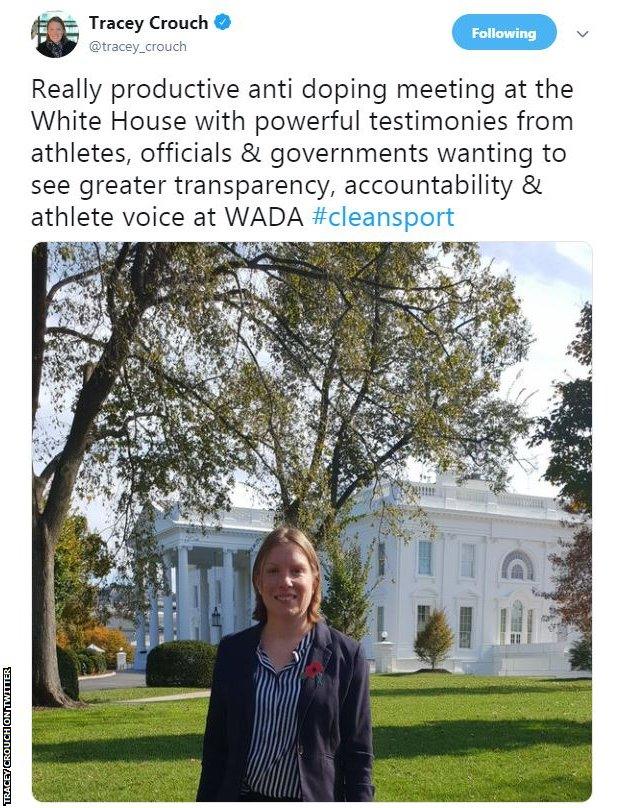White House summit says Wada has put 'politics over principle' and needs reform
- Published
Wada officials 'disrespected' me, Scott tells BBC sports editor Dan Roan
An emergency anti-doping summit at the White House heard athletes have been "failed" by the World Anti-Doping Agency as it called for an inquiry into claims of bullying at the organisation.
Wada Athlete Committee chair Beckie Scott recently told BBC Sport that some of the organisation's most senior officials tried to "bully" her over her opposition to lifting a ban on Russia.
The meeting in Washington also called for an overhaul of Wada's governance and for it to have more respect for the "the voice of athletes".
The Office of National Drug Control Policy (ONDCP) and the United States anti-doping agency (Usada) hosted the meeting.
Wada said it had not been invited but this claim was later dismissed by Usada chief executive Travis Tygart.
"Athletes shouldn't have to shoulder the burden of fixing Wada but here they are, along with national anti-doping leaders, doing Wada's job for them," said Tygart.
"Today was the tipping point."
Britain's sports minister Tracey Crouch, UK anti-doping chief executive Nicole Sapstead and British cyclists Callum Skinner and Elinor Barker were among the delegation at the meeting.
Russian whistleblower Yuliya Stepanova was also there, along with representatives of Nado, which is a group of leading national anti-doping bodies, and politicians.
"Wada and the IOC (International Olympic Committee) have put autocracy over accountability, and politics over principle," said Skinner., external
"Athletes have woken up and found a voice. It's up to Wada and IOC to start listening and act."
American runner Emma Coburn,, external who won gold in the 3,000m steeplechase at the 2017 World Championships, said: "Wada has failed the athletes. It has bullied and disheartened athlete voices.
"This is the very organisation that's supposed to protect us."
What do delegates want to see changed?
After the summit, a statement listed reforms that Wada needed to undertake which were:
governing and operating in a respectful, accountable, democratic and transparent manner
including athletes as full voting members on its executive committee and in other essential governance functions
a robust independent inquiry to examine Wada's culture, leadership, and operations following the recent allegations of bullying and acts of intimidation at Wada
a significant and meaningful overhaul of Wada whereby individuals with active roles in sport must not simultaneously serve in leadership positions at Wada
an open and transparent process regarding securing all of the anti-doping samples and laboratory data in Russia, with a recommendation immediately after the 31 December deadline for compliance
This comes two days after the leaders of 18 anti-doping agencies held an emergency summit in Paris on Monday and also said Wada needed urgent reform following its reinstatement of Russia.
In September, Wada lifted a three-year ban on Russia's anti-doping agency (Rusada) that had been imposed for state-sponsored doping, with many athletes opposing the move.
Wada 'not invited' claim not true
Wada's response to the meeting was that it had not been invited and that "only one side of the story was heard in Washington".
It added that if it had been it would have been able to "bring perspective to the debate, to explain why the decision to reinstate Rusada, under strict conditions, was the right one for clean sport, and to outline the governance review process, which was initiated by Wada in January 2017".
However, Tygart said: "Wada were invited hence why Wada vice-president Linda Helleland was in the room championing clean sport and listening to athletes.
"There were also Wada executive committee members - Edwin Moses and Clayton Cosgrove. Wada leadership is trying to pull the wool over peoples' eyes once again."
He added: "There is nothing remotely one-sided about having the world's athletes, national anti-doping leaders, government ministers and other clean sport champions at an emergency summit to drive reform of Wada.
"Wada leadership, along with the IOC, are increasingly isolated with athletes and public opinion. They need to wake up and smell the coffee, step out from their ivory tower because athletes are demanding change and change is coming."
Analysis
Alex Capstick, BBC Sport news reporter
The tone of the message at the end of a meeting packed with Wada's fiercest critics should come as no surprise. Anti-doping campaigners from the likes of the US, the UK, Ireland, Germany and Australia have been calling for reform ever since September's controversial decision to reinstate Russia.
The difference this time is that their frustrations have been channelled through the White House.
In addition to asking for a decision-making group independent of sport and a commitment to govern in a democratic and transparent manner, they have also demanded a robust enquiry to examine Wada's culture.
It follows recent allegations of bullying and intimidation during the voting process to re-admit Russia. Wada's leadership is under increasing pressure and it's a group of people they are charged with protecting - athletes, passionate about their sport - who are now spearheading the growing calls for change.
Wada's complaint that the debate was skewed because no-one was present to put across an alternate view seems a fair one. But then Wada's reasons for lifting the ban on Russia have been well documented and Wada's vice-president, the Norwegian government minister Linda Helleland, did attend the meeting at the White House, although not in an official capacity (she voted against Russia's reinstatement).
So where does it all leave us? Another statement, more emotion and more demands but no threat to withdraw Wada's funding which is split equally between government and the IOC.
Working on transforming Wada is the favoured option, but for how long?

Sports Minister Tracey Crouch was part of the delegation at the White House anti-doping summit